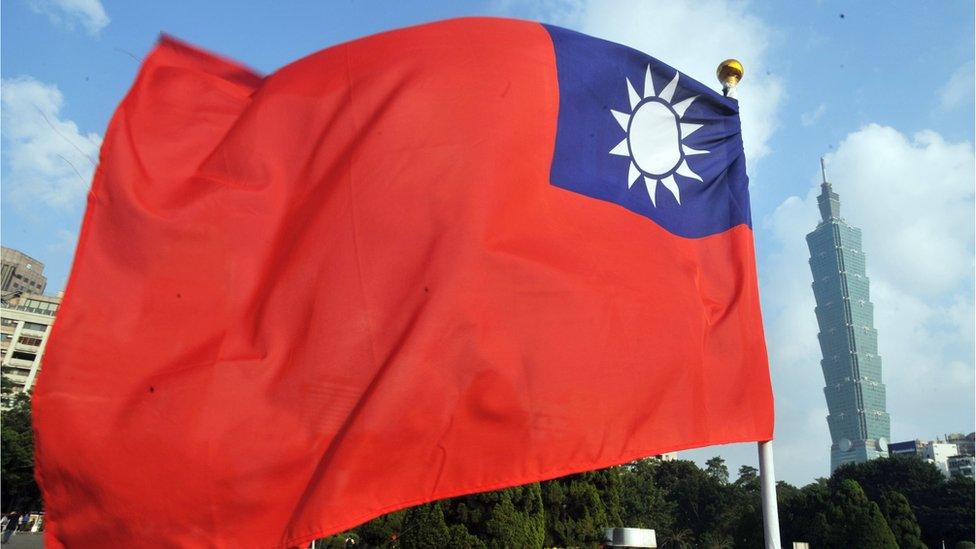China and Taiwan leaders hail historic talks
- Published
It was a "handshake for the history books" as Karishma Vaswani reports from Singapore
The leaders of China and Taiwan have held historic talks in Singapore - their first in more than 60 years.
Chinese President Xi Jinping and Taiwan's President Ma Ying-jeou shook hands at the start of the talks, which were seen as largely symbolic.
China views Taiwan as a breakaway province which will one day be reunited with the mainland.
But many Taiwanese see it as independent and are concerned at China's growing influence.
The awkward questions that could crop up
What's behind the China-Taiwan divide?
"Both sides should respect each other's values and way of life," Mr Ma said as the talks began at a luxury hotel.
Mr Xi told the Taiwanese leader: "We are one family."
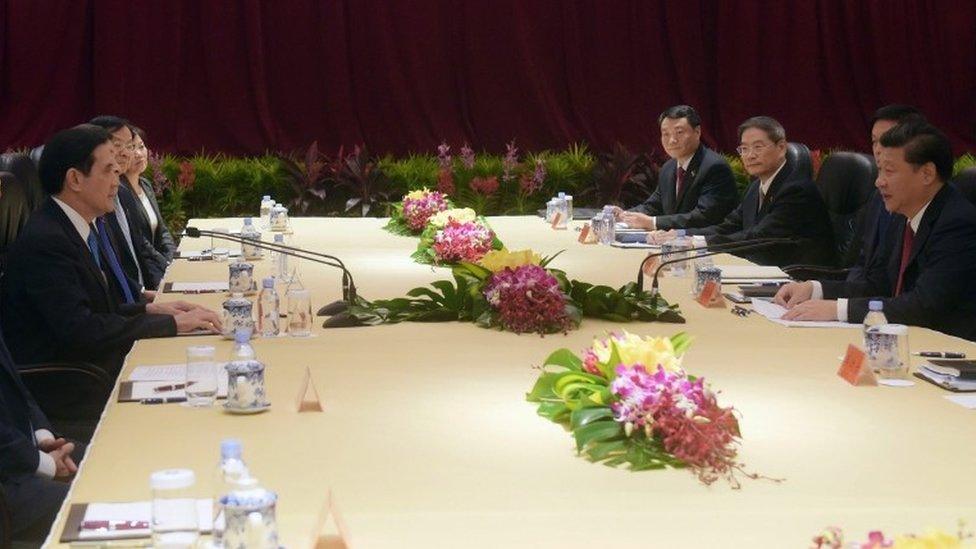
The meeting "has opened a historic chapter in the cross-Strait relations, and history will remember today", he added.
The meeting took place in neutral territory on the sidelines of a state visit by Mr Xi to Singapore.
Relations between China and Taiwan have improved under Mr Ma since he took office in 2008, with better economic ties, improving tourism links, and a trade pact signed.
The two sides split in 1949 when the Kuomintang lost to the Chinese Communist Party in the civil war and set up a new government in Taiwan.
Cindy Sui reports on protests in Taipei against the meeting between Taiwan and China
What wasn't discussed
Mr Ma described the talks as "positive and friendly", but no major agreements or deals appear to have been reached.
Mr Ma said in advance that the issue of the South China Sea disputes, which has dominated recent concerns in the region, would not be brought up.
What was discussed
Mr Ma proposed reducing hostility across the Taiwan Strait, expanding exchanges and establishing a cross-strait hotline, according to Taiwan's central news agency.
He said this was part of consolidating the "1992 consensus" - the agreement under which both sides recognise the principle of "one China" but define it in their own ways.
Similar remarks were made by Mr Xi, who said upholding the consensus would help "the great rejuvenation of the Chinese nation".
China-Taiwan relations in 60 seconds
Why are they meeting now?
It is not entirely clear why the meeting has happened at this time, as neither side has properly said.
Mr Ma has built his presidency on closer links with China, so there is a good reason for him to meet Mr Xi, says the BBC World Service's Asia editor, Michael Bristow.
There is also a presidential election in Taiwan in January. Mr Ma might think the meeting will give a boost to his party's candidate, who is trailing in the polls, our correspondent says.
China also has something to gain, and that also concerns Taiwan's election. Mr Xi's decision to talk reminds Taiwanese voters that China is far friendlier to a government of Mr Ma's nationalist party than one formed by the opposition, which leans towards independence for Taiwan.
It is a calculated gamble for Mr Xi, as China's attempts to influence Taiwanese voters have previously backfired, our correspondent adds.

Taiwan-China key dates
1949: Chiang Kai-shek's Kuomintang (KMT) nationalists form their own government in Taiwan after Mao Zedong's communists take power in Beijing
1971: Taiwan loses its seat at the UN to China
1979: The US establishes diplomatic relations with China while at the same time committing itself to defending Taiwan
1993: First direct talks between the two sides take place in Singapore
2005: Beijing brings in a law that makes secession by Taiwan illegal, at the risk of military action
2008: High-level talks between the two sides resume after Ma Ying-jeou is elected president

The reaction in Taiwan and China
Growing fears over China's influence have led to widespread dissatisfaction in Taiwan.
President Ma's Kuomintang (KMT) Party suffered a crushing defeat in local elections last year, a result that was widely seen as a rejection of Mr Ma's push for closer ties with China.
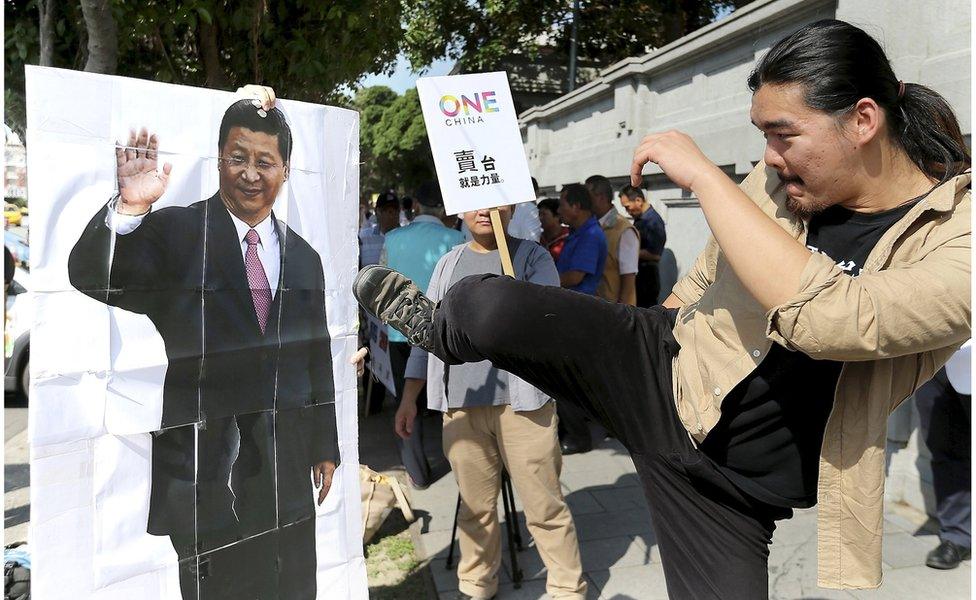
Anti-Beijing protesters held protests in Taipei against the meeting...
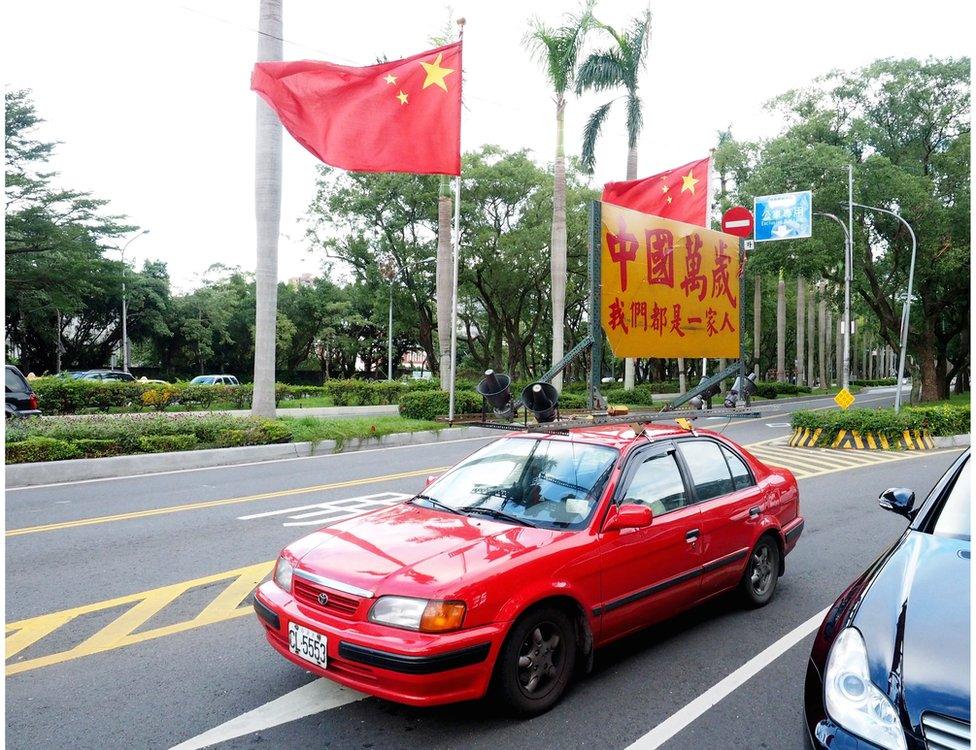
...but pro-unification groups have also demonstrated their support, with posters saying "Long live China, we are all one family"
In the Taiwanese capital there were protests before the talks and one group tried to enter the parliament building.
State media in China heralded the meeting, with an editorial in the Chinese Communist Party mouthpiece People's Daily, external calling it a "victory of peace and rationality".
It said critics were "displaying jiggery-pokery from a small circle. Such extremism is bound to be stigmatised".
- Published4 May 2015
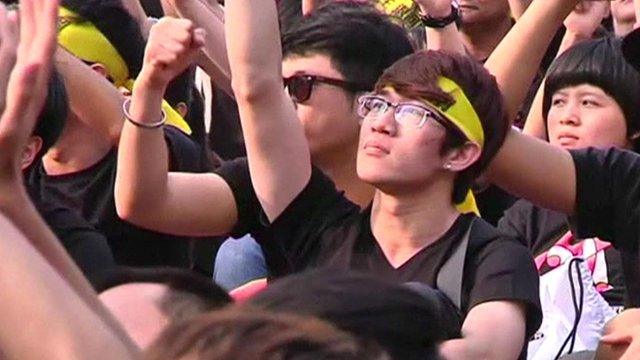
- Published14 October 2024
